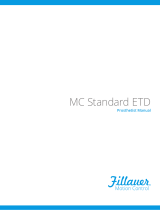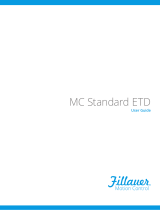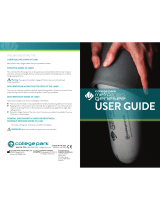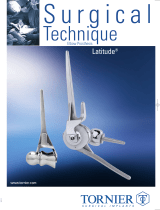
10
Dong your U3 or U3+
Before removing a U3 elbow, make sure the elbow is in the unlocked position, switch the elbow OFF, and
remove the prosthesis.
Before removing a U3+ elbow, you will nd it more convenient to extend the elbow, enabling Silent
Freeswing. Then turn the elbow OFF and remove the prosthesis.
Control of your Prosthesis
EMG Control
The elbow may be exed (raised) or extended (lowered) in response to a contraction of the muscles that
control the arm, usually the biceps and triceps. The elbow will rise to 150° above vertical. The harder the
muscle contracts, the faster the arm moves. If you learn to control your muscle inputs well, the arm is
capable of both very smooth, steady motions and very quick motions (Figure 7).
Harness-Mounted Input
If harness-mounted inputs are used, the pressure you exert on the sensor determines the speed of the
arm. By relaxing the pressure on the sensor, the elbow will drop (extend) – the lower your pressure on
the sensor, the faster the elbow drops.
Silent Freeswing1
When you relax the input(s) to the elbow completely, it will swing
freely. This freeswing feature allows the arm to look and feel more
natural. For instance, it will swing by your side while you walk. Also,
you can lower the elbow quickly, without any muscle eort. The
motor produces this freeswing, however, so it uses up some of the
battery charge.
1Silent Freeswing feature for U3+ wearers only. The elbow drive
disconnects when the elbow reaches full extension with a bump. To
reconnect, simply use the motor to raise the elbow and the elbow drive
will auto reconnect.
The battery charge will last longer if you turn the arm OFF at times
when you don’t care to have the freeswing function.
Automatic Lock
The Lock is activated automatically using the arm motor, when the
elbow is held motionless. Use a steady input signal to hold the arm
still, and it will lock. The lock time is set by the prosthetist. If the
elbow is hanging freely, or the weight of the forearm is supported,
e.g., on a table or on your knee, the lock will not activate.
Automatic Unlock
The elbow is unlocked by the rapid contraction of the control input(s),
followed by rapid relaxation. Strong eorts are not necessary, the
quickness of the input signal is what triggers the unlock. The lock will
not actually disengage until the weight of the arm is lifted o the lock
mechanism, by raising the arm up, or pushing it up slightly.
Figure 7 – Myoelectric Elbow
Control; contract your “up” muscle
to raise. Relax both muscles to
lower with “Silent Freeswing”
























